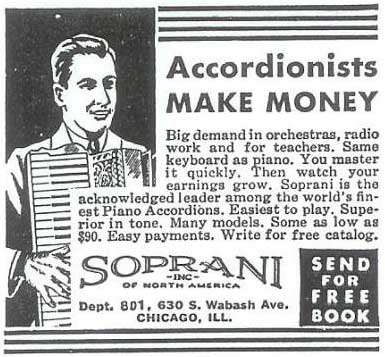
It’s easy to forget the accordion was once one of the country’s most popular instruments and accordion players were in high demand. But this Soprani accordion ad pitching the accordion’s money-making potential actually appeared in the August 1931 issue of The Etude Music Magazine. I wonder how many out-of-work musicans — keep in mind, this was during the Great Depression — embraced the get-rich-quick pitch: “Big demand in orchestras, radio work and for teachers… You master it quickly. Then watch your earnings grow.” Sounds great! Where do I sign up?
(Found via Lenny Feldmann, the Cordeen Man.)

6 Comments:
Ah, I wish I could get a new accordion for $90! Though that was a lot more money back then.
by Clayton on July 28th, 2009
I want to be on the list too. In fact, for a decent Soprani, I’d pay double. Har!
by mister anchovy on July 28th, 2009
I’ve been reading a fabulous book, “How the Beatles Destroyed Rock ‘n’ Roll,” by Elijah Wold.*
Wold basically lives up to his sub-title, “An alternative history of American popular music.” Starting in the 1890’s, he reexamines the birth of jazz, focusing less on what jazz-critics and modern fans like, and more on what people listened and danced to. Very interesting.
About the dance-band period this ad’s from he says:
“The failure of large swing bands to snap back after the war startled a lot of people, and the most startled were the bandleaders themselves. In hindsight, though, the surprising thing is that hundreds of touring dance orchestras had been able to flourish for so long. Prohibition had pushed the ballroom business into larger venues, and the combined shocks of sound films and the Depression had flooded the market with musicians who were willing to work for almost nothing, so for about twenty years big bands were in demand and easy to staff.” (pg. 151.)
He’s got a line about musicians suddenly realizing their reliable paychecks had disappeared. Tens of thousands of people lost their jobs to sound movies, prohibition (which killed a lot of venues), radio, records, and then amplification reducing the need for big orchestras. It was a rough time to “make money” for a lot of musicians.
*He’s also author of the equally fabulous “Narco-Corrido,” which has a lot more accordion content. I await his history of the accordion in pop-music.
http://www.elijahwald.com/
by Bruce Triggs of Accordion Noir Radio on July 28th, 2009
My radio co-host Rowan found a Soprani just like that in the back of an old theatre here in Vancouver. It rattled inside, and when we opened it up about twenty reed sets just poured out. It looks like it got stored next to a radiator or something and one half of the beeswax melted.
Be fun to clean it up someday.
by Bruce Triggs of Accordion Noir Radio on July 28th, 2009
Thanks for sharing that passage from the Elijah Wald book, Bruce. I keep meaning to pick up “Narco-Corrido” when I have time.
by Chris on July 28th, 2009
Might be a little off-topic, but I am wondering if someone might be able to direct me to an expert that could identify the age of the accordion here:
http://accordionstop.com
This is an accordion I have in my basement that my Grandpa used to own and play.
by Rob on August 18th, 2009